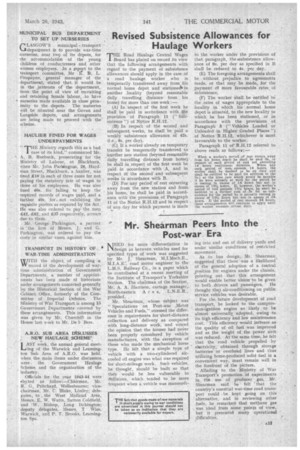Mr. Shearman Peers Into the Post-war Era,
Page 19

If you've noticed an error in this article please click here to report it so we can fix it.
NEE.D for more -differentiation in design as between vehicles used for specified types of work was suggested by Mr. J. Shearman, M.I.Mech.E.,
road motor engineer to the L.M.S. Railway Co., in a paper which he contributed at a recent meeting of the Institute of Transport's Yorkshire Section. The chairman of the Section, Mr. A. A. Harrison, cartage manager, North-eastern A r e a, presided. Mr. Shearman; whose subject was " Speculations on Post-war ,Motor Vehicles and Fuels," stressed the difference in requirements for short-distance collection and delivery as compared with long-distance work, and voiced the opinion that the former had never been properly considered by vehicle manufacturers, with the exception of those who made the mechanical horse type. He felt that a simple type of vehicle with a tWo-cylindered aircooled oil engine was what was required for short-mileage work. Such vehicles, be thought, should be built so that they would be less vulnerable to dollisions, which tended to be more frequent when a vehicle was manceul7r
ine into and out of delivery yards and under similar conditions of restricted movement. • As to bus design, Mr. Sheamian, suggested that there was a likelihood of the general adoption of a central _position for engines under the chassis, pointing out that this arrangement would enable better vision-to be given to both drivers and passengers. • He thought that air-conditioning on public service vehicles was desirable.
For .the future development of road transport, he looked to the compression-ignition engine as likely, to be almost universally adopted, owing to its high efficiency and low maintenance cost. This efficiency would increase as the quality of oil fuel was improved and as the weight of the power Unit was reduced. At the same time, he felt that the road vehicle propelled by electricity, obtained through storage batteries or overhead lines and thus utilizing home-produced solid fuel in a convenient way, must remain well in the forefront of the picture.
Alluding to the Ministry of War Transport's promotion of experiments in the use of producer gas, Mr. Shearmau said he felt that the country's essential war-time road transport could .be kept going on this alternative, and in reviewing other fuels, he remarked. that methane gas was ideal from some points of view, bat it presented many operational difficulties.




















































